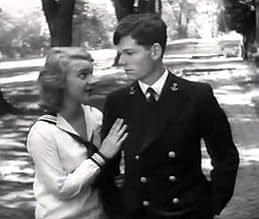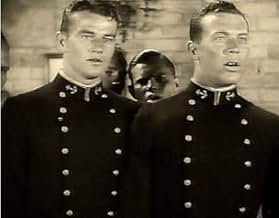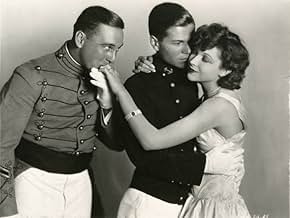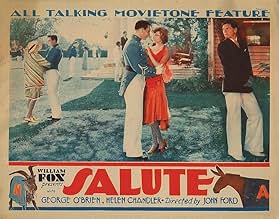Ajouter une intrigue dans votre langueFraternal rivalry intensifies when two brothers play on opposing teams in a big Army-Navy football match.Fraternal rivalry intensifies when two brothers play on opposing teams in a big Army-Navy football match.Fraternal rivalry intensifies when two brothers play on opposing teams in a big Army-Navy football match.
- Réalisation
- Scénario
- Casting principal
John Breeden
- Midshipman
- (non crédité)
Ben Hall
- Midshipman Joel Farragut Gish
- (non crédité)
Jack Pennick
- Football Player
- (non crédité)
Harry Tenbrook
- Assistant Navy Coach
- (non crédité)
Lee Tracy
- Radio Announcer
- (non crédité)
John Wayne
- Midshipman Bill
- (non crédité)
Avis à la une
Although his older brother "John Randall" (George O'Brien) is currently attending West Point, a young man fresh out of high school by the name of "Paul Randall" (William Janney) is excited at the opportunity to go to Annapolis where his grandfather, "Rear Admiral John Randall" (Lumsden Hare) had also attended many years before. Upon arriving there, however, he soon finds things much more difficult than he had previously imagined and, had it not been for a young woman named "Nancy Wayne" (Helen Chandler), he might not have been able to handle the stress. Yet as much as he appreciates Nancy and enjoys spending time with her, that quickly changes when one of John's female admirers named "Marian Wilson" (Joyce Compton) appears and suddenly begins to show an interest in him--and then John arrives, and things really get complicated for all concerned. Now, rather than reveal any more, I will just say that this was an okay film which, unfortunately, stands out more as a historical curiosity than a good romantic-comedy. Of special interest was the presence of both John Wayne (as "Midshipman Bill") and Ward Bond ("Midshipman Harold") in supporting roles. Likewise, the uniforms and equipment used by the football players in the Army-Navy game was also rather interesting as well. Be that as it may, even though this movie is quite dated, it still managed to pass the time fairly well, and I have rated it accordingly. Average.
Salute is an early talkie directed by John Ford and it will never rank in anybody's list of great John Ford films. He honed this particular genre of military academy films down to a science in much better films like The Long Grey Line and Wings Of Eagles.
George O'Brien and William Janney are brothers raised by different grandfathers, O'Brien by a general and Janney by an Admiral and they both go to the service academies of each. O'Brien being older got to West Point before Janney arrived at Annapolis.
Janney is always playing second fiddle to O'Brien and when O'Brien puts some moves on Helen Chandler who Janney has flipped over, that makes the Army/Navy game a bit more personal than usual.
John Wayne and Ward Bond are a pair of upper classmen in Annapolis who take Janney over the coals. Best performance in the film is from Frank Albertson as Janney's smart mouth roommate.
It was interesting to see both Wayne and Bond before either of them was any kind of a name. The integration of newsreel footage of the Army/Navy game was well done by Ford, very similar to how he used newsreel film from Ireland in The Plough And The Stars. But Salute is a film for John Wayne or John Ford completists.
George O'Brien and William Janney are brothers raised by different grandfathers, O'Brien by a general and Janney by an Admiral and they both go to the service academies of each. O'Brien being older got to West Point before Janney arrived at Annapolis.
Janney is always playing second fiddle to O'Brien and when O'Brien puts some moves on Helen Chandler who Janney has flipped over, that makes the Army/Navy game a bit more personal than usual.
John Wayne and Ward Bond are a pair of upper classmen in Annapolis who take Janney over the coals. Best performance in the film is from Frank Albertson as Janney's smart mouth roommate.
It was interesting to see both Wayne and Bond before either of them was any kind of a name. The integration of newsreel footage of the Army/Navy game was well done by Ford, very similar to how he used newsreel film from Ireland in The Plough And The Stars. But Salute is a film for John Wayne or John Ford completists.
This is largely forgotten, and it's curious as to why. Never mind that I seem to like it a fair bit more than most who've seen it, but it's the first John Ford movie with speaking roles by John Wayne and Ward Bond. Wayne has shown up as an extra in a handful of other films (I've never been able to find him, though I haven't looked too hard), but he talks here! In a talkie! The movie itself seems to have been born from a simple idea: film the Army-Navy football game and build a movie around it, and the movie that came from that idea is an endearing little slice of life film about a pair of brothers.
Two brothers, John Randall (George O'Brien) and Paul Randall (William Janney) are the grandsons of a great naval hero, raised by separate relatives after their parents died. John, the elder, is a cadet at the United States Military Academy while the younger is about to enter the Naval Academy at Annapolis. The early scenes in the film are all about establishing the friendly relationship between the two brothers, hinting at the rivalry between the two schools, and establishing their mutual female friend Marian (Joyce Compton).
Paul goes to the Academy and learns the ropes of life on campus before the arrival of the elder classmen. He learns to march, makes friends with a fellow midshipman Albert (Frank Albertson), and gets to know a local girl, Helen (Nancy Wayne). When the elder classmen arrive, he immediately gets on the wrong side of Harold (Ward Bond) and Bill (John Wayne) in the midst of trying out for football. He ends up too small to be terribly effective on the field, and Harold becomes convinced that Paul got him in trouble for a bit of hazing he put Paul through. It isn't true, but the retribution is enough to get Paul righteously angry, deciding to simply quit the Academy rather than be in an organization that allows for someone like Harold. Truth comes out, Paul misses roll call the next morning as he wanders with Helen, and Paul and Harold make up with Harold promises to help Paul become a better football player.
There's a dance where John comes along with Marian. This is an amusing scene as Harold tries to dance with a series of girls, only to politely give up the dance every time to another as well as another midshipman, a nebbish little guy, tries to fill his absent sister's dance card, being constantly rejected. The meat of this scene is that John ends up stealing Helen away from Paul, creating a rivalry between the two that can only be solved on one battlefield: the football field.
Yeah, it's not challenging stuff, but it's lightly told, amusing (I had one gut busting moment of laughter), and solidly built. The finale is the Army-Navy game, and it ends in a way that makes everyone happy with more amusing things along the way.
The most interesting thing about the game, to me, though is the sound design. In the earliest days of sound it was only possible to get a single track of sound onto the mono mix at a time, and it usually had to be captured live. Ford didn't let the sound limitations prevent him from doing what he wanted visually, however. He cut this all together, using footage from the real game, small plays filmed with the actors, an announcer in a booth, a handful of spectators (including Marian and Helen), and some sideline stuff without any real concern for how the sound would cut together. It ends up creating a complete hodgepodge of sound that gets distractingly endearing to me. There's no base sound running through it all like a cheering crowd, so we get shots of the sideline that are completely silent except for the dialogue cut right next to crowd shots that overwhelmed the microphones.
Another sound design note: the dialogue. The Black Watch was almost embarrassing in how Ford directed his actors in dialogue scenes, and he seems to have learned very quickly that it wasn't the way to go. Filming on location at Annapolis and its surroundings, the delivery of the dialogue (often marred by environmental sounds from the locations themselves) are naturalistic and crisp. There's no pausing for instructions anymore.
The film doesn't really have much of a plot, but it does have an endearing story of two brothers on opposite sides of a historic rivalry, developing their own rivalry, and then finding the common ground in the end. It's far from challenging, but it is amusing and a fun watch.
Two brothers, John Randall (George O'Brien) and Paul Randall (William Janney) are the grandsons of a great naval hero, raised by separate relatives after their parents died. John, the elder, is a cadet at the United States Military Academy while the younger is about to enter the Naval Academy at Annapolis. The early scenes in the film are all about establishing the friendly relationship between the two brothers, hinting at the rivalry between the two schools, and establishing their mutual female friend Marian (Joyce Compton).
Paul goes to the Academy and learns the ropes of life on campus before the arrival of the elder classmen. He learns to march, makes friends with a fellow midshipman Albert (Frank Albertson), and gets to know a local girl, Helen (Nancy Wayne). When the elder classmen arrive, he immediately gets on the wrong side of Harold (Ward Bond) and Bill (John Wayne) in the midst of trying out for football. He ends up too small to be terribly effective on the field, and Harold becomes convinced that Paul got him in trouble for a bit of hazing he put Paul through. It isn't true, but the retribution is enough to get Paul righteously angry, deciding to simply quit the Academy rather than be in an organization that allows for someone like Harold. Truth comes out, Paul misses roll call the next morning as he wanders with Helen, and Paul and Harold make up with Harold promises to help Paul become a better football player.
There's a dance where John comes along with Marian. This is an amusing scene as Harold tries to dance with a series of girls, only to politely give up the dance every time to another as well as another midshipman, a nebbish little guy, tries to fill his absent sister's dance card, being constantly rejected. The meat of this scene is that John ends up stealing Helen away from Paul, creating a rivalry between the two that can only be solved on one battlefield: the football field.
Yeah, it's not challenging stuff, but it's lightly told, amusing (I had one gut busting moment of laughter), and solidly built. The finale is the Army-Navy game, and it ends in a way that makes everyone happy with more amusing things along the way.
The most interesting thing about the game, to me, though is the sound design. In the earliest days of sound it was only possible to get a single track of sound onto the mono mix at a time, and it usually had to be captured live. Ford didn't let the sound limitations prevent him from doing what he wanted visually, however. He cut this all together, using footage from the real game, small plays filmed with the actors, an announcer in a booth, a handful of spectators (including Marian and Helen), and some sideline stuff without any real concern for how the sound would cut together. It ends up creating a complete hodgepodge of sound that gets distractingly endearing to me. There's no base sound running through it all like a cheering crowd, so we get shots of the sideline that are completely silent except for the dialogue cut right next to crowd shots that overwhelmed the microphones.
Another sound design note: the dialogue. The Black Watch was almost embarrassing in how Ford directed his actors in dialogue scenes, and he seems to have learned very quickly that it wasn't the way to go. Filming on location at Annapolis and its surroundings, the delivery of the dialogue (often marred by environmental sounds from the locations themselves) are naturalistic and crisp. There's no pausing for instructions anymore.
The film doesn't really have much of a plot, but it does have an endearing story of two brothers on opposite sides of a historic rivalry, developing their own rivalry, and then finding the common ground in the end. It's far from challenging, but it is amusing and a fun watch.
Bad performances by George O Brian and William Janney as rival brothers who end up playing the big Army-Navy football game against each other. Steppin Fetchit is given a lot of screen time and his performance is embarrassing and racist by today's standards, but he might make you smile occasionally even while you wince;he is very charismatic.John Wayne has a few brief scenes as one of a trio of cadets who haze (very mildly) the hero.The best parts of the movie are the unusually crisp location filming of the real Annapolis circa 1929. The big football game is unexciting and has no surprises. There is one good performance by Frank Albertson whose spirited portrayal of the callow roommate who talks back to his C.O. is the film's highlight.No real John Ford touches in this programmer.
I had just watched John Ford's first Talking film, "The Black Watch" (1929) with Victor McLaglen and Myrna Loy, and I was amazed at how well it worked. It was an odd, but interesting mixture of a James Bond type movie with a "Gunga Din" British- in-India flavor. I was amazed that Ford made such a great talkie his first time out.
I was expecting good things here, as the movie starts out with seemingly as a drama with a brother joining the Navy to rival his older brother who has a successful career in the Army. It quickly goes from drama to light comedy, much of it very light.
The Naval Academy atmosphere is quite nice and realistic looking, but it clashes with the small scope of the comedy. The best gag in the film is a rather homely guy trying to fill up a dance card for his sister. The Academy men expect that his sister will look like him and make up excuses for not offering to dance. When she turns out to be very cute, they all change their minds and try to get a chance to dance with her.
Its predictable, but mildly amusing.
Without a developed central conflict, one is left to appreciate some of the films occasional nice touches. This is an early talking appearance by Stepin Fetchit. He's quite funny here. There's a funny brief guest appearance by future star Lee Tracy as a Football announcer. Also John Wayne and Ward Bond deliver a few laughs. It is amusing watching Wayne throw a pie at one of the Navy recruits.
It is the major central romantic characters in the film, William Janney and Helen Chandler, who are dull and have little chemistry together. Chandler did go on to star in "Dracula" (1931), so it is interesting watching her doing comedy here.
George O'brien get star billing, but he is really a minor supporting character. He was apparently given star billing because he was far more famous than Janney. He had starred in two hit films with Janet Gaynor, "Blue Eagle" (1926) and. F. W. Munau's masterpiece, "Sunrise," (1927). This was Janney's first starring role.
Again, if you want to see Ford directing a great action-adventure early talkie, watch "The Black Watch," if you want to see Ford sputtering at directing a quirky, predictable and dull light comedy, watch this one.
I was expecting good things here, as the movie starts out with seemingly as a drama with a brother joining the Navy to rival his older brother who has a successful career in the Army. It quickly goes from drama to light comedy, much of it very light.
The Naval Academy atmosphere is quite nice and realistic looking, but it clashes with the small scope of the comedy. The best gag in the film is a rather homely guy trying to fill up a dance card for his sister. The Academy men expect that his sister will look like him and make up excuses for not offering to dance. When she turns out to be very cute, they all change their minds and try to get a chance to dance with her.
Its predictable, but mildly amusing.
Without a developed central conflict, one is left to appreciate some of the films occasional nice touches. This is an early talking appearance by Stepin Fetchit. He's quite funny here. There's a funny brief guest appearance by future star Lee Tracy as a Football announcer. Also John Wayne and Ward Bond deliver a few laughs. It is amusing watching Wayne throw a pie at one of the Navy recruits.
It is the major central romantic characters in the film, William Janney and Helen Chandler, who are dull and have little chemistry together. Chandler did go on to star in "Dracula" (1931), so it is interesting watching her doing comedy here.
George O'brien get star billing, but he is really a minor supporting character. He was apparently given star billing because he was far more famous than Janney. He had starred in two hit films with Janet Gaynor, "Blue Eagle" (1926) and. F. W. Munau's masterpiece, "Sunrise," (1927). This was Janney's first starring role.
Again, if you want to see Ford directing a great action-adventure early talkie, watch "The Black Watch," if you want to see Ford sputtering at directing a quirky, predictable and dull light comedy, watch this one.
Le saviez-vous
- AnecdotesJohn Wayne was responsible for assembling a group of USC football players for the cast, one of which was Ward Bond. The director was furious at Bond for constantly ordering steak and drinks from hotel room service and fired him. Wayne stood up to the director and forced him to keep Bond on, and a lifetime friendship was born.
- GaffesJohn Wayne is introduced in the film as one of the new midshipman, visible in their early training, especially in the rowing sequence. But later, he has a noticeable role as an upperclassman hazing the new men.
- ConnexionsFeatured in Hommes sans femmes (1930)
- Bandes originalesAnchors Aweigh
(1906) (uncredited)
Music by Charles A. Zimmerman
Played at the dance and as background
Sung by the John Wayne, Frank Albertson, and midshipmen
Played on piano by Helen Chandler
Sung by Helen Chandler and William Janney
Meilleurs choix
Connectez-vous pour évaluer et suivre la liste de favoris afin de recevoir des recommandations personnalisées
Détails
- Durée
- 1h 24min(84 min)
- Couleur
- Rapport de forme
- 1.20 : 1
Contribuer à cette page
Suggérer une modification ou ajouter du contenu manquant







































